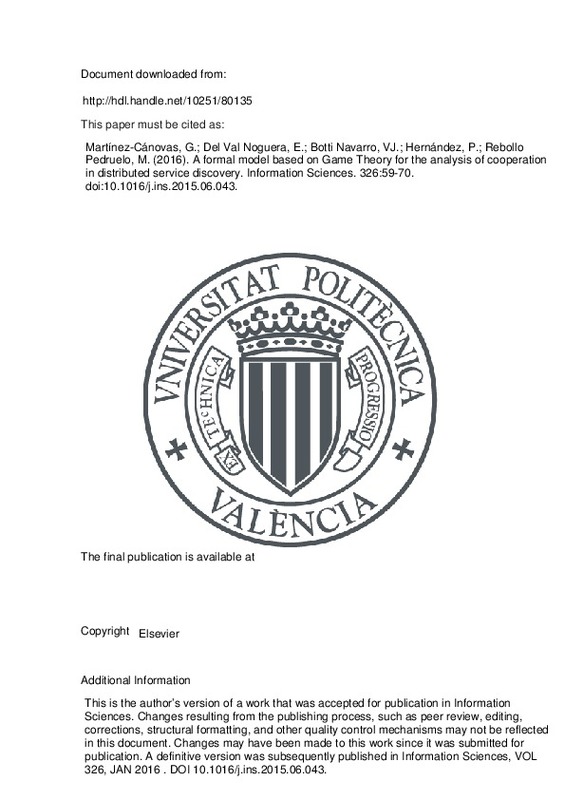JavaScript is disabled for your browser. Some features of this site may not work without it.
Buscar en RiuNet
Listar
Mi cuenta
Estadísticas
Ayuda RiuNet
Admin. UPV
A formal model based on Game Theory for the analysis of cooperation in distributed service discovery
Mostrar el registro sencillo del ítem
Ficheros en el ítem
| dc.contributor.author | Martínez-Cánovas, Guillem
|
es_ES |
| dc.contributor.author | Del Val Noguera, Elena
|
es_ES |
| dc.contributor.author | Botti Navarro, Vicente Juan
|
es_ES |
| dc.contributor.author | Hernández, Penélope
|
es_ES |
| dc.contributor.author | Rebollo Pedruelo, Miguel
|
es_ES |
| dc.date.accessioned | 2017-04-27T12:28:54Z | |
| dc.date.available | 2017-04-27T12:28:54Z | |
| dc.date.issued | 2016-01-01 | |
| dc.identifier.issn | 0020-0255 | |
| dc.identifier.uri | http://hdl.handle.net/10251/80135 | |
| dc.description | This is the author’s version of a work that was accepted for publication in Information Sciences. Changes resulting from the publishing process, such as peer review, editing, corrections, structural formatting, and other quality control mechanisms may not be reflected in this document. Changes may have been made to this work since it was submitted for publication. A definitive version was subsequently published in Information Sciences, VOL 326, JAN 2016 . DOI 10.1016/j.ins.2015.06.043. | es_ES |
| dc.description.abstract | New systems can be designed, developed, and managed as societies of agents that interact with each other by offering and providing services. These systems can be viewed as complex networks where nodes are bounded rational agents. In order to deal with complex goals, they require cooperation of the other agents to be able to locate the required services. The aim of this paper is formally and empirically analyze under which circumstances cooperation emerges in decentralized search of services. We propose a repeated game model that formalizes the interactions among agents in a search process where agents are free to choose between cooperate or not in the process. Agents make decisions based on the cost of their actions and the expected reward if they participate forwarding queries in a search process that ends successfully. We propose a strategy that is based on random-walks, and we study under what conditions the strategy is a Nash equilibrium. We performed several experiments in order to evaluate the model and the strategy and to analyze which network structures are more appropriate to promote cooperation. © 2015 Elsevier Inc. All rights reserved. | es_ES |
| dc.description.sponsorship | This work is supported by SP2014800, TIN2011-27652-C03-01, TIN2012-36586-C03-01, PROMETEOII/2013/019 and by the Spanish Ministry of Science and Technology [Project ECO2013-46550-R and FEDER, PROMETEOII/2014/054]. | en_EN |
| dc.language | Inglés | es_ES |
| dc.publisher | Elsevier | es_ES |
| dc.relation.ispartof | Information Sciences | es_ES |
| dc.rights | Reserva de todos los derechos | es_ES |
| dc.subject | Networks | es_ES |
| dc.subject | Distributed service discovery | es_ES |
| dc.subject | Nash equilibrium | es_ES |
| dc.subject | Repeated games | es_ES |
| dc.subject.classification | CIENCIAS DE LA COMPUTACION E INTELIGENCIA ARTIFICIAL | es_ES |
| dc.subject.classification | BIBLIOTECONOMIA Y DOCUMENTACION | es_ES |
| dc.subject.classification | LENGUAJES Y SISTEMAS INFORMATICOS | es_ES |
| dc.title | A formal model based on Game Theory for the analysis of cooperation in distributed service discovery | es_ES |
| dc.type | Artículo | es_ES |
| dc.identifier.doi | 10.1016/j.ins.2015.06.043 | |
| dc.relation.projectID | info:eu-repo/grantAgreement/MICINN//TIN2011-27652-C03-01/ES/INTERACCION MULTIAGENTE PARA PLANIFICACION/ / | es_ES |
| dc.relation.projectID | info:eu-repo/grantAgreement/EC/H2020/662725/EU/Bridging the gap: from Individual Behaviour to the Socio-tEchnical MaN/ | en_EN |
| dc.relation.projectID | info:eu-repo/grantAgreement/MINECO//ECO2013-46550-R/ES/COMUNICACION DIGITAL, CIBERSEGURIDAD Y CONFIANZA EN MERCADOS DIGITALES EN RED. POLITICAS DE REGULACION/ | es_ES |
| dc.relation.projectID | info:eu-repo/grantAgreement/MINECO//TIN2012-36586-C03-01/ES/SOCIEDADES HUMANO-AGENTE: DISEÑO, FORMACION Y COORDINACION/ | es_ES |
| dc.relation.projectID | info:eu-repo/grantAgreement/Generalitat Valenciana//PROMETEOII%2F2014%2F054/ES/PROMETEOII%2F2014%2F054/ | es_ES |
| dc.relation.projectID | info:eu-repo/grantAgreement/Generalitat Valenciana//PROMETEOII%2F2013%2F019/ES/PROMETEOII%2F2013%2F019/ | es_ES |
| dc.relation.projectID | info:eu-repo/grantAgreement/MEC//SP2014800/ES/SP2014800/ / | es_ES |
| dc.rights.accessRights | Abierto | es_ES |
| dc.contributor.affiliation | Universitat Politècnica de València. Departamento de Sistemas Informáticos y Computación - Departament de Sistemes Informàtics i Computació | es_ES |
| dc.contributor.affiliation | Universitat Politècnica de València. Facultad de Administración y Dirección de Empresas - Facultat d'Administració i Direcció d'Empreses | es_ES |
| dc.contributor.affiliation | Universitat Politècnica de València. Escola Tècnica Superior d'Enginyeria Informàtica | es_ES |
| dc.description.bibliographicCitation | Martínez-Cánovas, G.; Del Val Noguera, E.; Botti Navarro, VJ.; Hernández, P.; Rebollo Pedruelo, M. (2016). A formal model based on Game Theory for the analysis of cooperation in distributed service discovery. Information Sciences. 326:59-70. https://doi.org/10.1016/j.ins.2015.06.043 | es_ES |
| dc.description.accrualMethod | S | es_ES |
| dc.description.upvformatpinicio | 59 | es_ES |
| dc.description.upvformatpfin | 70 | es_ES |
| dc.type.version | info:eu-repo/semantics/publishedVersion | es_ES |
| dc.description.volume | 326 | es_ES |
| dc.relation.senia | 300126 | es_ES |







![[Cerrado]](/themes/UPV/images/candado.png)

